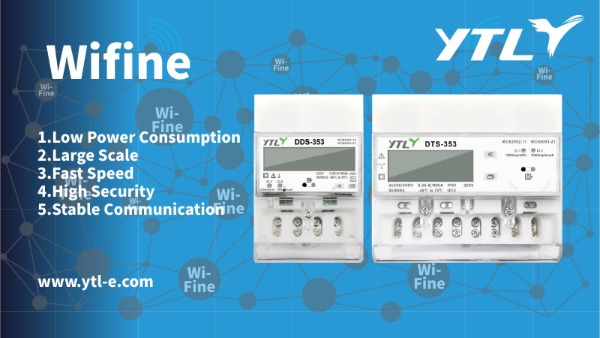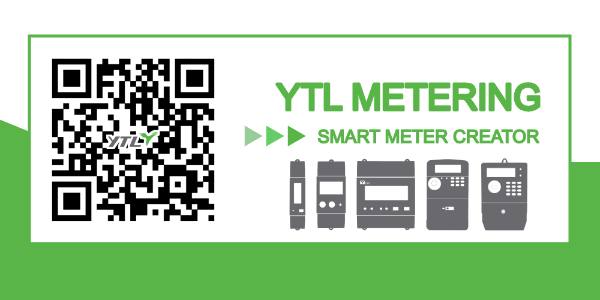LoRa, Wi-Fine, and Wi-Sun wireless communication technologies are favored in the field of electric meters primarily due to their unique technological characteristics, making them highly suitable for applications in this domain. Below is a specific analysis of these technological advantages:

I. Advantages of LoRa Wireless Communication Technology
1. Ultra-Long Communication Range: LoRa employs spread spectrum modulation, enabling signal transmission even in low signal-to-noise ratio environments. As a result, LoRa can achieve communication distances of several kilometers in open environments, significantly reducing the number of base stations required and decreasing deployment costs. This feature is particularly advantageous for remote monitoring and data transmission of electric meters.
2. Low Power Consumption: LoRa devices have extremely low power consumption in sleep mode, allowing them to remain operational for extended periods without frequent battery replacements. This makes LoRa devices especially suitable for applications that require long-term operation without easy access to battery replacements, such as in the sustained functioning of electric meters.
3. Strong Anti-Interference Capability: LoRa technology demonstrates robust anti-interference characteristics, ensuring stable data transmission even in complicated environments. Even in challenging terrain conditions, LoRa maintains good communication performance, guaranteeing reliable data transmission from electric meters.
4. Ease of Deployment and Maintenance: LoRa networks employ a star topology that simplifies network configuration and cabling. Users only need to install LoRa devices at appropriate locations to facilitate data collection and transmission. Furthermore, LoRa devices support remote configuration and upgrades, making maintenance and management convenient for users.
II. Advantages of Wi-Fine Wireless Communication Technology
1. Distributed Network: Wi-Fine eliminates central nodes, allowing all nodes to function equally within a flat network structure. Each node calculates its own routing without requiring control from a central entity. Nodes can move freely while maintaining continuous data flow.
2. Network Topology: Wi-Fine nodes can establish connections with neighboring nodes, maximizing the redundancy between network nodes. This results in a highly resilient network with multi-path concurrency, allowing network throughput to exceed physical layer wireless rates. Routing protocols dynamically seek out as many routing nodes as possible, enabling seamless routing transitions that do not require additional time. The departure of certain nodes does not affect the remaining network.
3. Large Network Scale and Wide Coverage: A single Wi-Fine network can be infinitely expanded by deploying multiple gateways. Each gateway can manage networks with up to 255 levels of relay routing. The protocol stack resource overhead is independent of the number of network nodes, indicating no theoretical limit to network size, enabling up to 255 or 65,535 levels of routing in mesh networks.
4. Comprehensive Data Collection: Wi-Fine can establish routing within seconds simply by broadcasting a reading message from the gateway. This allows networks, regardless of topology, with thousands of nodes to collect data in mere seconds.
5. Communication Distance and Penetration Capability: Wi-Fine employs spread spectrum modulation technology that enables signal transmission in low signal-to-noise ratio environments, achieving point-to-point communication distances of 2-3 kilometers. It supports various regional frequency bands (915, 868, 433 MHz), granting it enhanced penetration capabilities.
III. Advantages of Wi-Sun Wireless Communication Technology
1. Excellent Penetration Capability and Communication Range: Wi-Sun operates in the sub-G frequency band, naturally providing outstanding penetration capabilities and longer communication distances. This makes Wi-Sun particularly suitable for the remote monitoring and data transmission of electric meters.
2. Mesh Self-Organizing and Self-Healing Capabilities: Wi-Sun supports mesh self-organization and self-healing features, accommodating large networks with up to 3,000 nodes and enabling data transmission across distances of over 10 kilometers with 24-hop relays. This organizational and self-healing capability ensures high reliability and stability, making Wi-Sun ideal for complex applications involving electric meters.
3. High Security: Wi-Sun employs AES encryption technology, enhancing communication security. In the context of electric meters, data security is critical, and Wi-Sun’s robust security measures ensure reliable data transmission and storage.
4. Support for Local Networking and Cloud Connectivity: Wi-Sun technology can facilitate local networking and cloud connectivity, addressing the needs of electric meters in orderly charging and load balancing scenarios. Additionally, cloud connectivity allows electric meters to engage in data exchange and collaborative operations with other smart devices, fostering intelligent management of smart grids.
In summary, the reasons LoRa, Wi-Fine, and Wi-Sun wireless communication technologies are favored in the electric meter domain include:
1. Their ultra-long communication ranges and low power characteristics make them highly suitable for the remote monitoring and data transmission needs of electric meters.
2. Strong anti-interference capabilities and self-organizing features ensure reliable data transmission and network stability for electric meters.
3. Ease of deployment and maintenance reduces the construction costs and complexities associated with electric meter systems.
4. Enhanced security measures guarantee the safe storage and transmission of electric meter data.
5. Local networking and cloud connectivity capabilities enable electric meters to exchange data and collaborate with other smart devices, facilitating the intelligent management of smart grids.
These advantages position LoRa, Wi-Fine, and Wi-Sun wireless communication technologies with broad application prospects and development potential in the field of electric meters.


 English
English 简体中文
简体中文






.jpg?imageView2/2/w/500/h/500/format/png/q/100)
.png?imageView2/2/w/500/h/500/format/png/q/100)

.png?imageView2/2/w/500/h/500/format/png/q/100)




